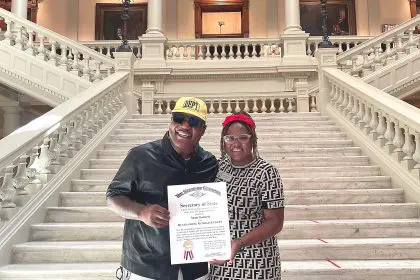 Some of the most horrific cases of domestic violence against women often start off most innocently: he doesn’t want her to go to the club; he tells her what to wear; he sits outside her home.
Some of the most horrific cases of domestic violence against women often start off most innocently: he doesn’t want her to go to the club; he tells her what to wear; he sits outside her home.
Yet, those innocent, “cute” little beginnings too often graduate — or better yet, mutate — into something much more sinister, says Toni Roberts, a paralegal and project coordinator at the State Families Office in Atlanta, who helps abused spouses get restraining orders and find refuge. The issue of domestic violence impacts blacks, but cuts across all ethnic lines, all demographics, Roberts testifies.
“They think that it’s real cute when he’s real jealous and he doesn’t want her to go to the club,” says Roberts. “Really, those are some telltale signs of someone who really wants to control you. Then it goes from there to pushing and then isolating them from their families.”
And sometimes it even leads to murder.
The statistics on domestic violence against women are horrid, even shocking, and it’s getting worse. Roberts says one in three women will experience some domestic violence during her lifetime [it was one in four just a few years ago]. Some 85 percent of all domestic violence is committed by men against women. Homosexual couples experience domestic violence at the same rate as heterosexual couples.
There’s not a single day that goes by that Roberts doesn’t see a case of domestic violence in Georgia.
“I have seen it all; there are people that come in everyday with something new. And, unfortunately, I’ve heard and seen where people have been beaten with bats and cameras and two-by-fours; they get second degree burns from boiling water through their clothing, stabbed, stalked, [people] sitting outside their job, their faces defaced …”
Roberts and her organization work with the Partnership with Domestic Violence to transition a victim from a hostile situation to a temporary safe haven.
“They do the sort of social services work — they provide the safety planning assistance,” she explained. “So, for example, a petitioner comes in and they’re in a situation to where they cannot go back home and they need emergency shelter right away, PADV would provide them with resources in terms of shelters, counseling services, housing assistance. … They can help out with lots and lots of different resources beyond getting past that initial protective order and basically helping them start their lives over.”
When Roberts mentions starting over, she’s talking about a physical move. But even more importantly, it means a women has to begin the process of mental and emotional repair. –terry shropshire










